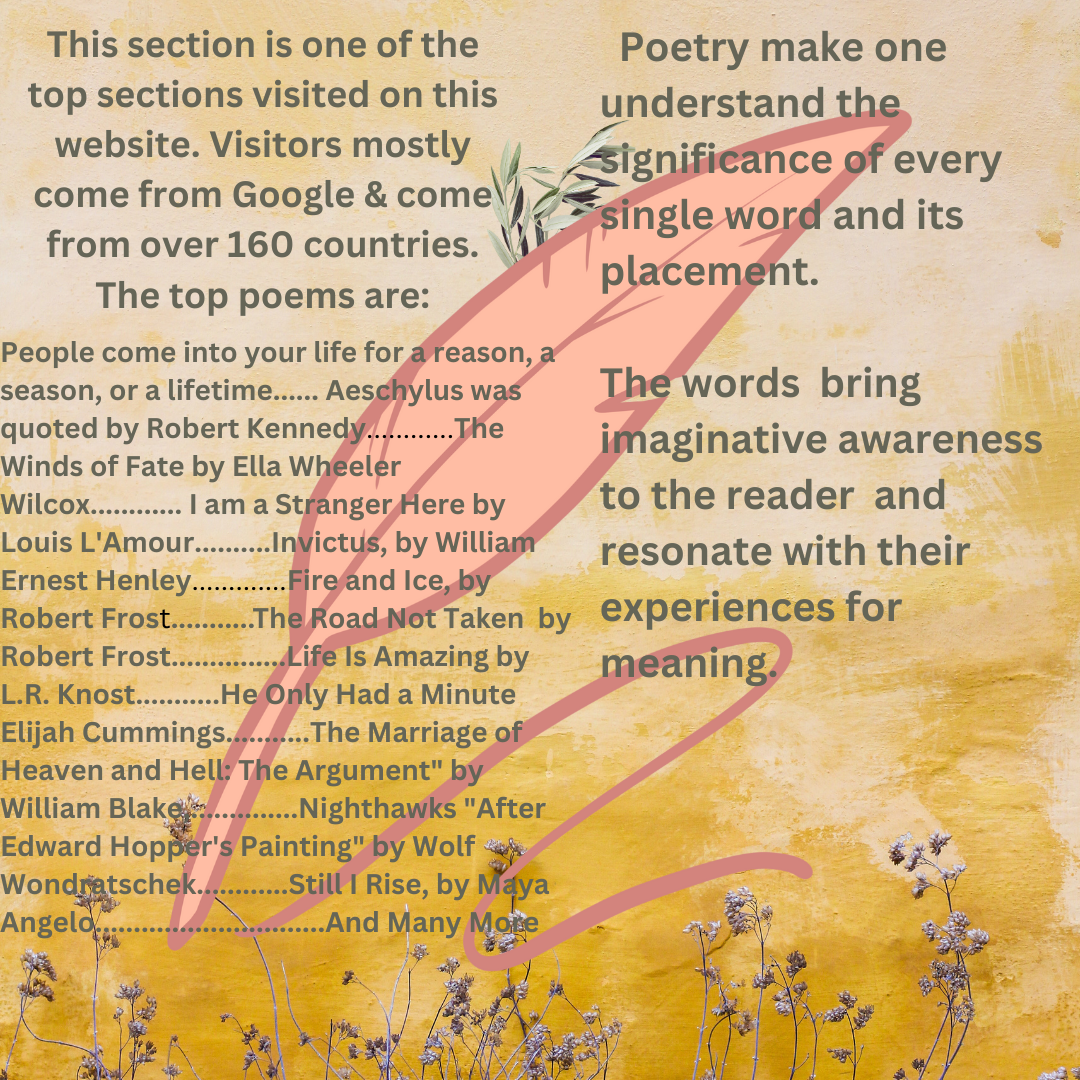Nighthawks "After Edward Hopper's Painting" by Wolf Wondratschek Reviewed →
A poem about the painting ‘Nighthawks’
'“After Edward Hopper’s Painting”
by Wolf Wondratschek
It is night
and the city is deserted.
The lucky ones are at home,
or more likely
there are none left.In Hopper’s painting, four people remain
the usual cast, so to speak:
the man behind the counter, two men, and a woman.
Art lovers, you can stone me
but I know this situation pretty well.Two men and one woman
as if this were a mere chance.
You admire the painting’s composition
but what grabs me is the erotic pleasure
of complete emptiness.They don’t say a word, and why should they?
Both of them smoking, but there is no smoke.
I bet she wrote him a letter.
whatever it said, he was no longer the man
who’d read her letters twice.The radio is broken.
The air conditioner hums.
I hear a police siren wail.
Two blocks away in a doorway, a junkie groans
and sticks a needle in his vein.
That’s how the part you don’t see looks.The other man is by himself
remembering a woman,
she wore a red dress, too.
That was ages ago.
He likes knowing women like this still exist
but he’s no longer interested.What might have been
between them, back then?
I bet he wanted her.
I bet she said no.
No wonder, art lovers,
that this man is turning his back on you
(This poem is an effective review of a famous painting. Edward Hopper's Nighthawk.
Click below for thoughts on that painting.
The Road Not Taken, by Robert Frost plus analysis
Two roads diverged in a yellow wood,
And sorry I could not travel both
And be one traveler, long I stood
And looked down one as far as I could
To where it bent in the undergrowth;
Then took the other, as just as fair,
And having perhaps the better claim,
Because it was grassy and wanted wear;
Though as for that the passing there
Had worn them really about the same,
And both that morning equally lay
In leaves no step had trodden black.
Oh, I kept the first for another day!
Yet knowing how way leads on to way,
I doubted if I should ever come back.
I shall be telling this with a sigh
Somewhere ages and ages hence:
Two roads diverged in a wood, and I—
I took the one less traveled by,
And that has made all the difference.
The Road Not Taken Analysis
Where did the two roads lead? Could they have both been to the same destination? Did the narrator only experience one of the roads? Is this poem suggesting that choice itself is like a road. Is the difference that we picked a road, or that we had a choice?
The poem implies that we won't make a difference in the world unless we make choices of our own. It isn't clear that making a difference was because of the road picked, but it seems clear that without having traveled one of them no difference would have resulted.
We are left wanting to make a difference, hoping for a less traveled road that is easier and safer. The call to action of this poem is a call to want the right thing.
Stick to Your Task, by anonymous →
Stick to your Task,
by Anonymous
Stick to your task till it sticks to you;
Beginners are many, but enders are few.
Honor, power, place and praise
Will come, in time, to the one who stays.
Stick to your task till it sticks to you;
Bend at it, sweat at it, smile at it too;
The Sick Rose, by William Blake, an analysis. →
The Sick Rose, by William Blake
O Rose thou art sick The invisible worm, That flies in the night In the howling storm:
Has found out thy bed Of crimson joy: And his dark secret love Does thy life destroy
Analysis of Poem
by Brent M. Jones
The rose and the worm represent humans. This rose is in a state of decay suggesting death is coming soon. The rose is feminine, delicate and represents love, loyalty and beauty,
The worm is masculine ( His dark secret love), invisible and comes at night. What happens is evil, secret and hurtful. What is done can't be found out and destroys the rose. Crimson joy and ‘dark secret love happen in the bed of the rose. The crimson color show the violence and passion and blood.
This seems like it may have been Blake's intent, but "why" was this his message? Was it a statement against the relationship of men and women? Was the masculinity of the worm the right relationship for the feminine rose? Perhaps Blake just was again in this poem just questioning the the accepted ideas of marriage in his day as so many authors and poets of that time did.
Was Blake so anxious to comment on male female relationships that he got this wrong? It was the bee that fertilized the rose. The worm just participated in the natural process of death. Blake was not alone among writers of the late 1800's in questioning the accepted ideas of marriage.
Life, by Charlotte Bronte Poem and Analysis →
Life, believe, is not a dream
So dark as sages say;
Oft a little morning rain
Foretells a pleasant day.
Sometimes there are clouds of gloom,
But these are transient all;
If the shower will make the roses bloom,
O why lament its fall?
Rapidly, merrily,
Life’s sunny hours flit by,
Gratefully, cheerily
Enjoy them as they fly!
What though Death at times steps in,
And calls our Best away?
What though sorrow seems to win,
O’er hope, a heavy sway?
Yet Hope again elastic springs,
Unconquered, though she fell;
Still buoyant are her golden wings,
Still strong to bear us well.
Manfully, fearlessly,
The day of trial bear,
For gloriously, victoriously,
Can courage quell despair!
Analysis and Thoughts on Poem
.A simple message suggesting that life is good. It takes on darkness that is felt to be bad and unpleasant. Clouds, like the bad days will clear. The days will "merrily" fly by. Things that go wrong will not be victorious. Nothing can beat you not even death. "Life is still life whatever it's pangs"-Charlotte Bronte Her Quotes sums it all up.
Annabel Lee by Edgar Allan Poe
It was many and many a year ago, In a kingdom by the sea, That a maiden there lived whom you may know By the name of Annabel Lee: And this maiden she lived with no other thought Than to love and be loved by me.
I was a child and she was a child, In this kingdom by the sea, But we loved with a love that was more than love- I and my Annabel Lee- With a love that the winged seraphs of Heaven Coveted her and me.
And this was the reason that, long ago, In this kingdom by the sea, A wind blew out of a cloud, chilling My beautiful Annabel Lee; So that her highborn kinsmen came And bore her away from me, To shut her up in a sepulchre In this kingdom by the sea.
The angels, not half so happy in Heaven Went envying her and me-Yes!-that was the reason (as all men know, In this kingdom by the sea) That the wind came out of the cloud by night, Chilling and killing my Annabel Lee.
But our love it was stronger by far that the love Of those who were older than we- Of many far wiser than we- And neither the angels in Heaven above Nor the demons down under the sea Can ever dissever my soul from the soul Of the beautiful Annabel Lee;
For the moon never beams without bringing me dreams Of the beautiful Annabel Lee; And the stars never rise, but I feel the bright eyes Of the beautiful Annabel Lee; And so, all the night-tide, I lie down by the side Of my darling-my darling- my life and my bride In her sepulchre there by the sea- In her tomb by the sounding sea.
Analysis of the Poem Annabel Lee
Perhaps Annabel Lee was inspired by Poe's wife, Virginia? The Poem was his last and well known as one of his best.
Many of his poems explore the death of a beautiful women. In the Raven he suggests that his love is gone and they will "nevermore" be together. In this poem he knows he will be with her again saying that not even demons "can ever dissever" their souls.
His love is deep and even ideal likely because he has married young. His youthful immaturity may be the reason for blaming the Gods for taking her out of jealousy.
Annabel Lee's death is the supreme loss reveals that she was worshiped both in life and death.
Edgar Allan Poe's wife, Virgina, shown above on the left
Do Not Go Gentle Into That Goodnight by Dylan Thomas Analysis →
"Do Not Go Gentle Into That Goodnight" -Dylan Thomas
Do not go gentle into that good night,
Old age should burn and rave at close of day;
Rage, rage against the dying of the light.
Though wise men at their end know dark is right,
Because their words had forked no lightning they
Do not go gentle into that good night.
Good men, the last wave by, crying how bright
Their frail deeds might have danced in a green bay,
Rage, rage against the dying of the light.
Wild men who caught and sang the sun in flight,
And learn, too late, they grieved it on its way,
Do not go gentle into that good night.
Grave men, near death, who see with blinding sight
Blind eyes could blaze like meteors and be gay,
Rage, rage against the dying of the light.
And you, my father, there on the sad height,
Curse, bless, me now with your fierce tears, I pray.
Do not go gentle into that good night.
Rage, rage against the dying of the light.
Analysis of Do Not Go Gentle Into That Good Night- by Brent M. Jones
Death will come to all of us and we evolve through life in stages of birth, then life ,and death. We start as "good men", often live as "wild men," but then finish as grave men."
The son is speaking in this poem to the father who seems to have accepted his coming death. In rage he tells his "grave" father on his deathbed to hold on.
The father is part of "the last wave" of his own generation which is almost gone, with only a few still alive. His memories are like a "green bay", bright and alive, where the younger generation is coming but where the father can't go back and change anything.
Blind eyes and bright lights suggest near death experiences by the old man while death still waits for him. Death is darkness and night and light is life.
The son pleads with the father, "Do not go gentle into that good night". The night can be considered as good, since it is so close and easy to obtain for the father, but that doesn't mean the son wants the father to go. He wants him to hold on and to "rage against the the dying of the light". If light goes away then the fathers life will end and it's presence proves his existence.
The father and the son may have accepted death by the end of this poem, but the son still wants more from the father. He asks, "Curse, bless, me now with your fierce tears" because your tears will show your love for me and curse your death for taking you..
This poem resonates with many. Sometimes death is only the final change and bits of life leave a little at a time with affirmatives and struggles and the poem tells us to rage and fight for life and sing in the sun of life.
The Eagle by Lord Alfred Tennyson
"He clasps the crag with hooked hands;
Close to the sun in lonely lands,
Ring'd with the azure world, he stands.
The wrinkled sea beneath him crawls;
He watches from his mountain walls,
And like a thunderbolt he falls."
Review of "The Eagle’ by Lord Alfred Tennyson" --by Brent M. Jones
The Eagles use of hooked hands begins the poets uses symbolism, imagery and metaphorical language to use the Eagle to learn about ourselves.
The use of "clasps, crag and crooked", in the first line sings to us. It draws our attention to the Eagle. The Eagle is "ringed with the azure world" seems above all creatures and represents men with power.
Alone and isolated ruling in the lonely lands from the mountain tops. The Eagle falls and men fall.
'
'
'
"It is up to you", by Clinton T. Howell →
It is up to you,
by Clinton T. Howell
"You are the one who has to decide. Whether you’ll do it or toss it aside. Whether you’ll strive for the goal that's afar. Or just be content to stay where you are."
Poem Analysis of “It is up to you”
This makes me think. Of course it is up to me! The problem is obvious, I have to decide. Where am I? What should I do? What do I work on? In each case I have to decide. Today I can pick just one of these challenges. What should I work on.
God has not Promised, by Annie Johnson Flint
Annie Johnson Flint
(1866-1932)
God has not Promised
God hath not promised skies always blue,
Flower-strewn pathways all our lives through;
God hath not promised sun without rain,
Joy without sorrow, peace without pain.
But God hath promised strength for the day,
Rest for the labor, light for the way,
Grace for the trials, help from above,
Unfailing sympathy, undying love.
God hath not promised we shall not know
Toil and temptation, trouble and woe;
He hath not told us we shall not bear
Many a burden, many a care.
God hath not promised smooth roads and wide,
Swift, easy travel, needing no guide;
Never a mountain, rocky and steep,
Never a river, turbid and deep.
























